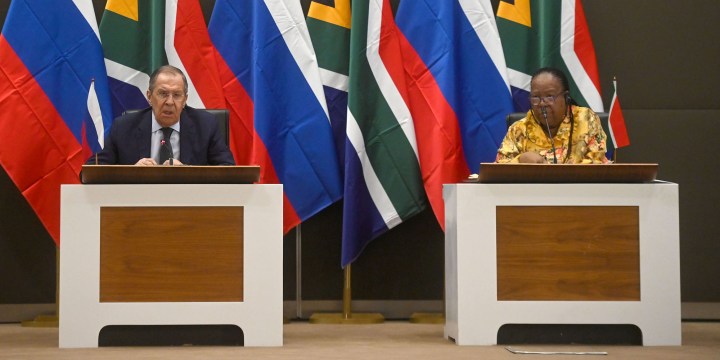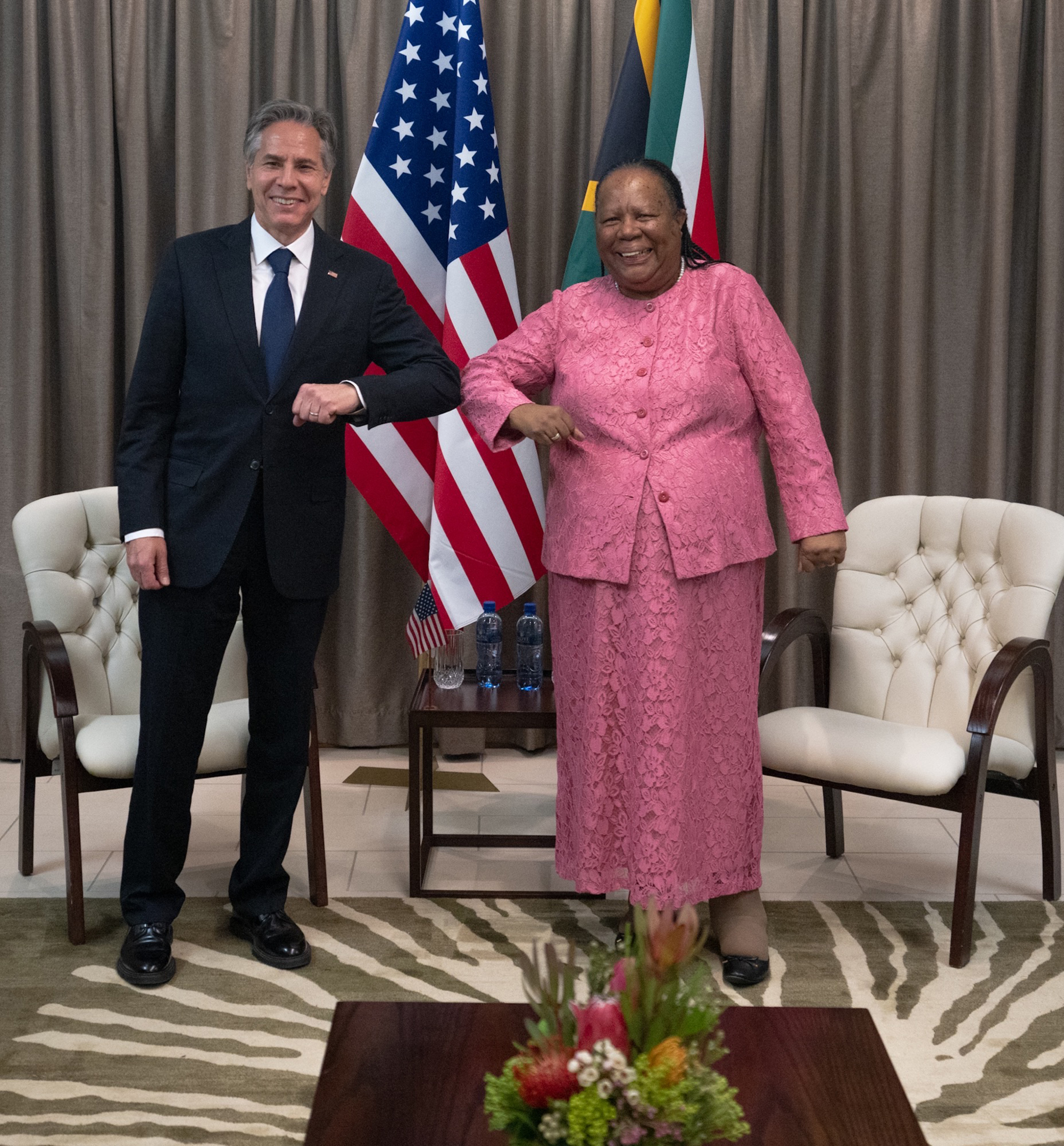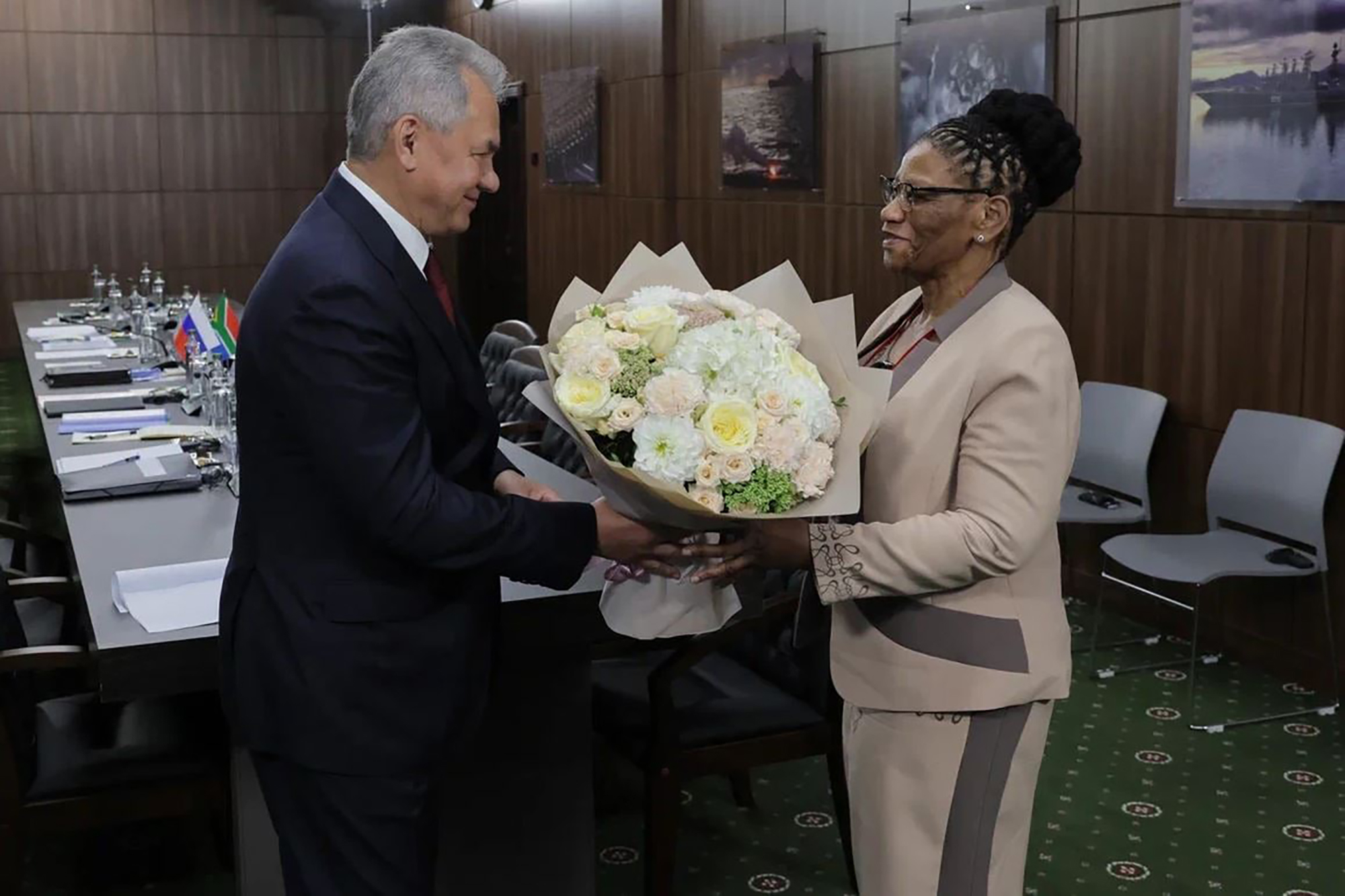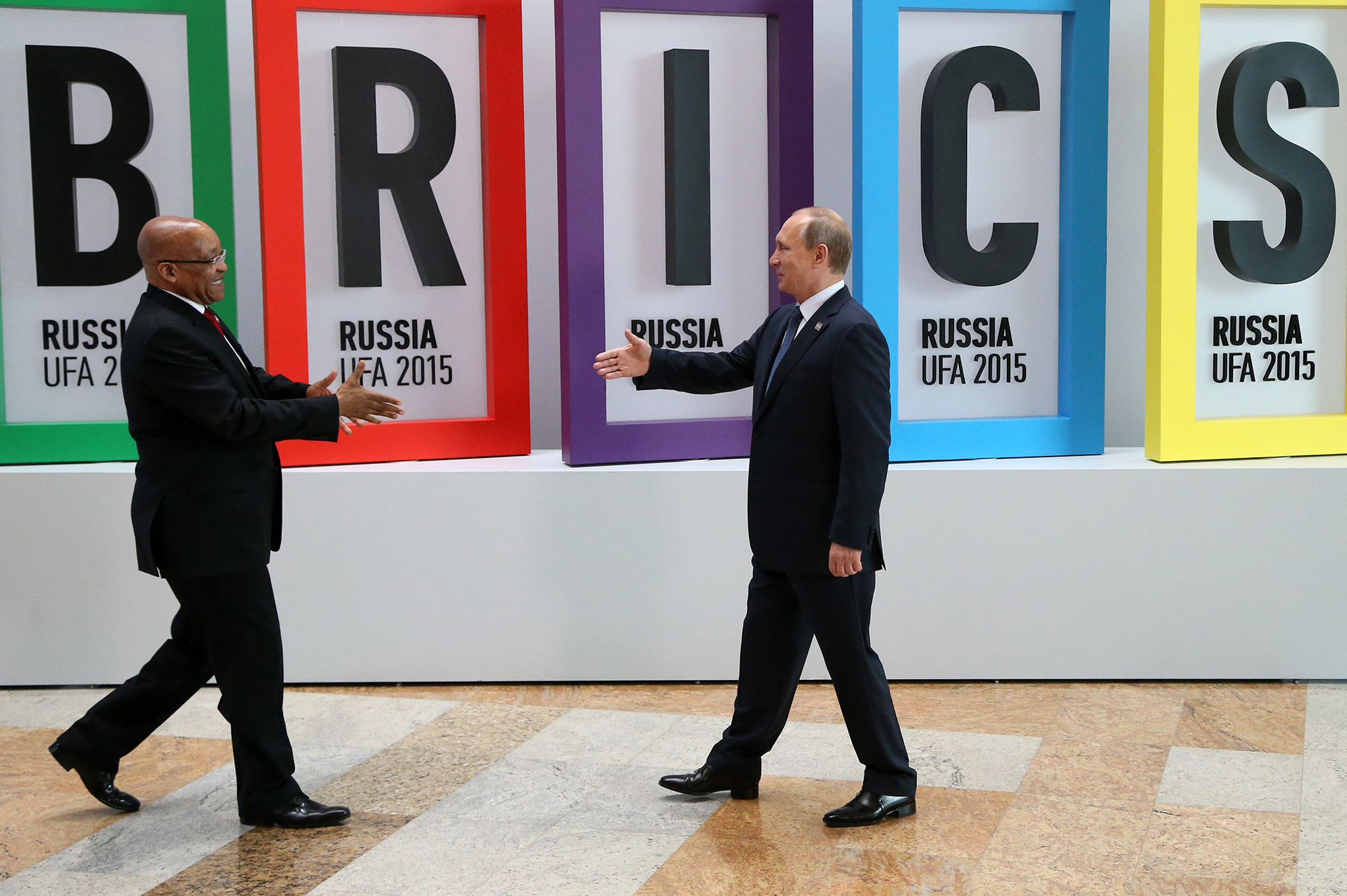AUTOCRACY ADORATION OP-ED
Trying to make sense of the senseless — South Africa’s bizarre fealty to Russia

The South African government appears to mistakenly believe that it can continue to side with Russia in the Ukraine conflict without any repercussions from an increasingly unified and clearsighted West. This may be a grave miscalculation with long-term consequences.
Following Russia’s invasion of Ukraine on 24 February 2022, the ANC government’s foreign policy has been a seemingly bewildering display of hubris, contradiction, and blatant double-speak.
Initially, South African Minister of International Relations and Cooperation Naledi Pandor’s public statements were neutral, even referring to the “Special Military Operation” as a “Russian invasion”. But soon after President Cyril Ramaphosa phoned Russian president Vladimir Putin “to get his perspective on the Ukrainian situation” (ignoring calls to contact Ukrainian president Volodymyr Zelensky), the government’s stance shifted towards accommodation of Russia’s view.
When President Ramaphosa eventually did contact president Zelensky, the call was more to explain South Africa’s position than to gain insight into the conflict.
Soon thereafter, in March 2022, members of the UN deliberated and voted on a resolution calling on Russia to halt its invasion and withdraw its forces from Ukraine. African countries cast 28% of all the UN votes. The majority (28) of African countries voted in favour of the resolution while 17 countries abstained (including South Africa), and only Eritrea voted against.
In early August 2022, Minister Pandor met with US Secretary of State Antony Blinken in Pretoria. South Africa’s relationship with the US has been tetchy for many years and it is therefore not surprising that the pronouncements by Blinken and Pandor were replete with the usual banalities of “strategic partnerships, common values and interests, peace and prosperity” etc.

United States Secretary of State Antony Blinken and Foreign Minister Naledi Pandor meet in Pretoria, South Africa on 8 August 2022. (Photo: Twitter / @SecBlinken)
Nevertheless, a week later, Minister of Defence and Military Veterans Thandi Modise attended the 10th Moscow Conference on International Security along with the military leaders of Burundi, Cameroon, Chad, Ethiopia, Guinea, Mali, Sudan, and Uganda.
Here the platitudes of Blinken’s visit were replaced with wondrous double-speak with Modise’s spokesperson boasting that South Africa is “ready to work with all peace-loving nations”, and even more bizarrely, Minister Modise stating that “through our own silence, inaction and selective morality, we have allowed warlords to reign supreme across the world. The world can no longer afford to be held to ransom by warmongers. They must be dragged kicking and screaming to the table of peace and multilateralism.”

South African Defence Minister Thandi Modise in Moscow with her Russian counterpart Sergei Shoigu. (Photo: SA Ministry of Defence and Veteran Affairs)
Russian General Sergei Shoigu ironically opined that “it is very encouraging that prominent military commanders from our friendly states — and the Republic of South Africa” were “holding their own” against the “return to the order and rules of engagement typical of the colonial period”.
A few months later (in early December 2022), there was the curious docking of the Lady R, a Russian Federation-flagged cargo vessel that has been sanctioned by the US and EU for illicitly shipping weapons.
It’s unclear whether the visit was related to Minister Modise’s Russia trip (the minister denies this and claims that the order for the mysterious cargo predates the Covid pandemic), and why the vessel docked at the South African naval base in Simon’s Town instead of at the commercial docks at the Table Bay Harbour, what the purpose of the visit was, why there was the need to switch off the vessels AIS, and why she unloaded and loaded her cargo in the dead of night during rolling blackouts?
No sooner had the Lady R steamed off than any pretence of neutrality was finally abandoned with Minister Pandor’s fawning over Russia Foreign Minister Sergei Lavrov during his visit to Pretoria in January 2023.
During this visit, it was proudly announced that Russia, China, and South Africa would hold joint naval exercises off Durban in February. Given the sorry state of the South African navy, it’s unclear how South Africa will benefit from these drills, which Minister Pandor described as “military exercises with friends worldwide”.
This has all made many wonder whether “the Russians have some kompromat on SA decision-makers; they’re paying them off; or SA decision-makers are incompetent and lacking any awareness of the objective of international relations and diplomacy. Or it could be a combination of the above.”
However, to make sense of the situation, one must ask: what does the ANC government hope to gain from Russia? To answer this question, it’s first necessary to look at SA’s post-apartheid relationship with Russia, and then consider what Russia has been up to on the African continent.
South Africa’s relationship with Russia
Most of the government’s pronouncements on Russia’s invasion of Ukraine reference the Soviet support for the exiled ANC during apartheid. However, much of this “special relationship” is a romanticism of history and is a relatively recent phenomenon.
Although the Soviet Union did provide political education, financial support and military training to the ANC during the apartheid years (particularly from 1956 to the early 1990s), the close association did not continue after South Africa’s democratic transition.
During the presidency of Nelson Mandela, the ANC government was ambivalent to the post-Soviet Boris Yeltsin government, seeking instead to foster multilateral cooperation with European countries, the US, and China. This tentatively started to change after then-deputy president Thabo Mbeki visited Moscow along with five Cabinet ministers in 1998.
A year later, president Mandela made his first visit to Moscow (in April 1999), mainly to thank Russia for Soviet support during the liberation Struggle but also to sign the Treaty on Principles of Friendly Relations and Partnership (which didn’t happen).
After president Putin’s visit to South Africa in 2006, the nascent ties between Russia and South Africa began to strengthen. The Treaty of 1999 was finally signed, facilitating economic cooperation in the mining and energy sectors, and Russia (along with China) began lobbying for South Africa to join the BRIC group, finally achieved in 2010.
South Africa’s “bromance” with Russia really gathered steam with the ascension of president Jacob Zuma in 2007, and especially during the State Capture years of 2013 to 2017. It was during the 5th BRICS summit in Durban in March 2013 that president Zuma and president Putin held meetings to facilitate Russian support for South Africa’s infamous $76-billion nuclear energy programme.
This was followed by frequent visits by president Zuma and numerous Cabinet ministers to meet with president Putin in Russia. The court-sanctioned end of the nuclear delusion in April 2017 and president Zuma’s resignation in May 2018 were a significant blow to Putin’s ambitions in South Africa.

Then South African president Jacob Zuma (left) greets Russian president Vladimir Putin (R) during the BRICS 2015 Summit in Ufa, Russia, on 8 July 2015. (Photo: Sasha Mordovets / Getty Images)
Yet this does not mean that president Putin has given up on potential South African entanglement, and it has been claimed that Russia is still actively gathering information that will aid its ability to manipulate the media and politicians in the future.
South Africa’s closer ties with Russia have however not translated into increased trade. During 2006, South Africa’s exports to Russia were just $99-million whereas exports to Japan were $6.2-billion, the US were $6-billion, the UK were $4.6-billion, Germany were $3.9-billion, and the Netherlands were $2.7-billion.
By the time president Zuma left the Union Buildings in 2018, exports to Russia had increased to $403-million but exports to South Africa’s main trading partners were $8.5-billion to China, $6.7-billion to Germany, $6.4-billion to the US, $5.9-billion to Japan, and $4.8-billion to the UK.
Therefore, trade with Russia is still relatively inconsequential, suggesting that the relationship between Russia and South Africa is primarily political rather than economic.
Russia in Africa
Russia’s engagement and presence in Africa still lag behind the other major powers. Similarly, Russia’s trade with Africa is also much lower than Africa’s trade with Europe, the US, China, and India.
Much of Russia’s trade focuses on oil, gas, and nuclear energy but Russia has also been expanding its African interests in minerals, especially uranium. Russian companies are producing aluminium in Nigeria; hydropower stations in Angola, Namibia, and Botswana; and are in the process of building nuclear power plants in Egypt, Ethiopia, Nigeria, Rwanda, and Zambia.
What Russia loses out on trade however, it seeks to make up for in military involvement. Before the invasion of Ukraine, Russia accounted for 35% of arms exports to Africa, compared to China at 17%, US at 9.6% and France at 6.9%. Africa is the second largest importer of Russian arms globally (especially in Algeria, Angola, Egypt and Uganda) and Russia has signed 20 bilateral military cooperation agreements with African governments in recent years for the supply of military hardware (aircraft, missiles, engines etc), cooperation on countering terrorism, jointly training troops for peacekeeping on the continent, and for military and police training.
The Putin regime has been very effective in using historic Soviet support to strengthen relations between Russia and African states, especially in countries where the African graduates of Soviet colleges (including many of South Africa’s political elite) hold powerful positions in government.
In the case of Africa’s most fragile states, the Russian strategy has been to offer military support and training using the notorious Wagner mercenaries and Russian government political support in exchange for billions in natural resources (examples include in the Central African Republic, Republic of Congo, Gabon, Guinea, Madagascar, Mozambique, South Sudan, and Zimbabwe).
Visit Daily Maverick’s home page for more news, analysis and investigations
In addition to incumbent leaders, Russia has also actively supported non-democratic surrogates in Libya, Mali, and Sudan.
In weakly democratic African countries that hold elections (such as Madagascar, Mozambique, and Zimbabwe), Russia has also been actively meddling in the democratic processes to support a political leader that will benefit Russian interests.
The techniques commonly used include fake news and bots, social media disinformation and surreptitious support of the preferred candidate, unfavourable messaging about opposition candidates, the dissemination of manipulated polling figures to the media, notifications about the election results from fake election monitoring organisations, and diplomatic bravado.
In more established African democracies, Russia has sought to undermine faith in the democratic process itself by raising questions about the effectiveness of democracy, exaggerating electoral weaknesses, overstating the ineffectiveness of the electoral process, and portraying the relationship between democracy and security as a zero-sum game.
Beyond covert election manipulation, Russian Foreign Minister Lavrov has also made several high-profile visits to African countries recently. These include visits to four countries in 2022 (Egypt, the Republic of the Congo, Uganda, and Ethiopia), four countries so far this year (Eswatini, Angola, Botswana, and South Africa), and a planned visit to four North African countries in 2024 (Tunisia, Mauritania, Algeria, and Morocco).
The goals of these visits have ostensibly been to entice African leaders towards adopting Putin’s patronage-based elitist political system, and to underscore four Russian talking points:
First, that Russia is not isolated internationally, despite expansive Western sanctions.
Second, to portray Russia as an unaffected superpower that maintains allies around the globe with whom it can conduct business as usual.
Third, to strengthen ties with African countries dependent on Ukrainian grain (while blaming the West for the lack of grain exports to divert attention from Russia’s weaponisation of food).
Fourth, along with China, to promote a post-liberal multipolar world — a Cold War concept where democracy, civil liberties and human rights are limited, and where international trade and political engagement are all transactional.
ANC government’s ideological double-speak
It is claimed that South Africa’s foreign policy is based on the principles of Pan-Africanism, South-South solidarity, non-alignment, independence, and progressive internationalism.
Yet, over the last two decades, South Africa has increasingly become a foreign policy delinquent rather than a champion of human rights and democracy. This can be seen from former president Mbeki’s policy of “quiet diplomacy” towards Zimbabwe since 2000 and former president Zuma’s U-turn on Libya in 2011, when South Africa initially voted for a flight ban to protect civilians from attacks by the Libyan air force but then reneged and instead called for international nations to respect Libya’s territorial integrity.
In 2015, president Zuma infamously allowed president Omar al-Bashir of Sudan to attend the AU summit in Johannesburg even though Al-Bashir was a “wanted war criminal” by the ICC for genocide in Darfur. Zuma was ordered by the South African courts to arrest Al-Bashir but instead accepted Al-Bashir’s invitation to visit Sudan.
South Africa’s UN voting record also clearly shows that the government has been unwilling to condemn human rights abuses in authoritarian regimes in Zimbabwe (2000 – 2008), Sudan (2007), North Korea (2014), Iran (2015, 2016), Burundi (2016), Syria (2015, 2016, 2018), Belarus (2017), and Myanmar (2017).
In addition, South Africa voted against resolutions that would condemn ethnic cleansing and rape (2007), prevent and counter extreme violence (2015), protect peaceful protests (2016), against violence and discrimination based on sexual orientation (2016), and to protect civil society targeted by authoritarian governments (2016).
No wonder The Economist has described South Africa’s foreign policy as “clueless and immoral”.
Contrary to its dismal UN voting record, the government insists that its position on the Russian invasion is consistent with its “independent and non-aligned foreign policy”.
Yet, indications are that the government believes Russia’s propaganda that the war in Ukraine is just another proxy war between Russia and the West (Nato) in Cold War v2.0.
Accordingly, South Africa has not supported sanctions against Russia because historically it claims that Western sanctions are often applied inconsistently or to hasten “regime change” (such as in Iraq and Libya). Thus, expecting the South African government to condemn Russia’s invasion of Ukraine may be logical and moral, but it’s also unfortunately naive.
Friends with benefits
Based on the discussion above, it seems that the ANC government believes that cosying up to Russia can benefit South Africa politically, economically, and electorally.
Politically
Although being a BRICS member has had limited benefits for South Africa, the government adheres to the ideology that BRICS is a multi-polar counterbalance to Western (G7) hegemony. Consequently, following the invasion of Ukraine, the South African government has attempted to portray the country as a brawny BRICS champion, rather than the sickly back-bencher that it actually is.
In addition, South Africa has $35-billion invested in the BRICS’s New Development Bank, set up in 2014, and is therefore unlikely to choose a path that may alienate China or India, both of which have significant trade and investment with South Africa.
Economically
South Africa has significant mineral, metal, and gas deposits that are of interest to Russia. Already, the Russian company, Norilsk Nickel’s joint venture with Rainbow Minerals is the largest mining partnership in the world.
With the ANC being technically bankrupt, the only source of income for the party is via the party’s in-house investment company Chancellor House, the largest investment of which is in South Africa’s fourth-largest manganese mine, United Manganese of Kalahari, part-owned by the Russian oligarch Viktor Vekselberg’s Renova Group.
Then there is the prospect for nuclear energy investment. South Africa is planning to build a new 2,500MW nuclear power plant to replace the Safari-1 research reactor with a Multi-Purpose Reactor (MPR) after 2030.
Mineral Resources and Energy Minister Gwede Mantashe denies that South Africa is engaging with Russia on the nuclear build and after State Capture, it is likely that any Russian involvement in South Africa’s nuclear build programme would be challenged by civil society.
Yet, Minister Mantashe has shown a willingness to use the powers that the National Nuclear Regulator Act gives him to try to bend the nuclear regulator to his whims. As Mantashe recently stated: “If you resist nuclear and you are a board member, I fire you, simple. You can’t be in a board of something you’re not advocating for.”
With no end in sight for South Africa’s worsening rolling blackouts, the pressure for nuclear energy is likely to become ever more pressing; and appetising for loot-hungry politicians and the opportunistic Putin regime.
Electorally
South Africa will hold its next national elections in 2024, and for the first time, there is the real risk that the ANC will fall below 50%. Data is scant, but it can be surmised that the ANC (especially the RET faction) could be receptive to Russia’s extensive experience with election manipulation, disinformation, and surveillance.
While it’s easy to claim that Russia’s election manipulation in African countries such as Mozambique and Zimbabwe is unlikely to be successful in South Africa, it should be borne in mind that Russia’s more sophisticated methods did likely influence the outcome of UK’s Brexit vote and the 2016 US elections.
Conclusion
South Africa’s pronouncements since the Russian invasion of Ukraine are less about human rights and international peace and security, and more about trying to balance its position in the increasingly illiberal BRICS group on the one side against the West on the other.
It is however apparent that South Africa has largely failed at this task, and its clumsy attempts to punch above its weight in an ever-more complex global environment are proving risky and potentially very expensive.
The South African government appears to mistakenly believe that it can continue to side with Russia in the Ukraine conflict (despite China and India questioning Putin’s rationale) without any repercussions from an increasingly unified and clearsighted West.
This may be a grave miscalculation because the Ukraine invasion has highlighted South Africa’s ongoing infatuation with autocracies. The consequences will become apparent in coming years but it’s likely that, except for AU mediation in some localised conflicts, the country will find it impossible to portray itself as a neutral mediator, further diminishing South Africa’s role and status in foreign affairs.
Economically, Russia is relatively small, and after the invasion of Ukraine, is increasingly disconnected from the international financial system.
Furthermore, Russia does not provide significant investment or trade to South Africa — comprising just 0.4% of South Africa’s total trade. Consequently, any decline in trade or investment from South Africa’s Western partners cannot be offset by Russia, which would instead make South Africa more dependent on trade with China and India.
Over the course of the last decade, South Africa has sacrificed its values of democracy and human rights in favour of securing its place among the increasingly nationalistic and undemocratic BRICS group.
The government’s response to the Russian invasion is therefore not confused or contradictory, it’s just a tragic abandonment of South Africa’s founding principles in favour of BRICS realpolitik. DM

















Comments - Please login in order to comment.